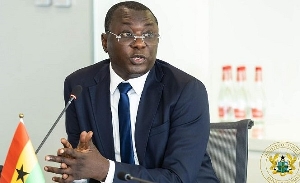The Ghanaian government expects the newly approved loan of 360 million U.S. dollars from the International Monetary Fund (IMF) to boost its foreign reserves, Finance Minister Mohammed Amin Adam said on Tuesday.
Adam said during a monthly press briefing on the economy that the new disbursement would also help stabilize the foreign exchange market.
The minister said Ghana’s satisfactory performance under the reforms has led to improvements in the external sector performance with significant improvements in current accounts and trade accounts, while the gross international reserves (GIR) data significantly outperformed initial projections.
“Ghana continues to build strong reserves with the GIR reaching 7.7 billion dollars by the end of Oct. 2024, representing 3.5 months of import cover compared with 5.2 billion dollars or 2.4 months of import cover in the same period last year,” he added.
Late Monday, the IMF announced its executive board’s approval for the third review of Ghana’s economic reforms, ordering an immediate release of an additional loan of 360 million dollars to strengthen the West African country’s reform implementation.
“Ghana’s performance under the IMF-supported program has been generally satisfactory. All quantitative performance criteria and indicative targets for the third review were met,” the IMF said in the release.
The Bank of Ghana said in its latest monetary policy committee press briefing in late November that Ghana’s external sector position had improved remarkably in the year, supported by a higher current account surplus and reduction in net financial outflows.
The central bank said these developments led to a strong external reserves build-up, with the current account surplus increasing to 2.2 billion dollars in the first nine months of the year, compared with a surplus of 912 million dollars over the corresponding period in 2023.
“The strong current account surplus was supported by increased gold and crude oil exports as well as robust remittance inflows,” the Bank of Ghana said. The West African cocoa, gold, and crude oil exporter has been implementing reforms since May 2023 with the support of a loan of 3 billion dollars from the IMF to revamp its economy from the multiple malaise of ballooning public debts, high inflation, a volatile foreign exchange market, and increasing cost of living.

